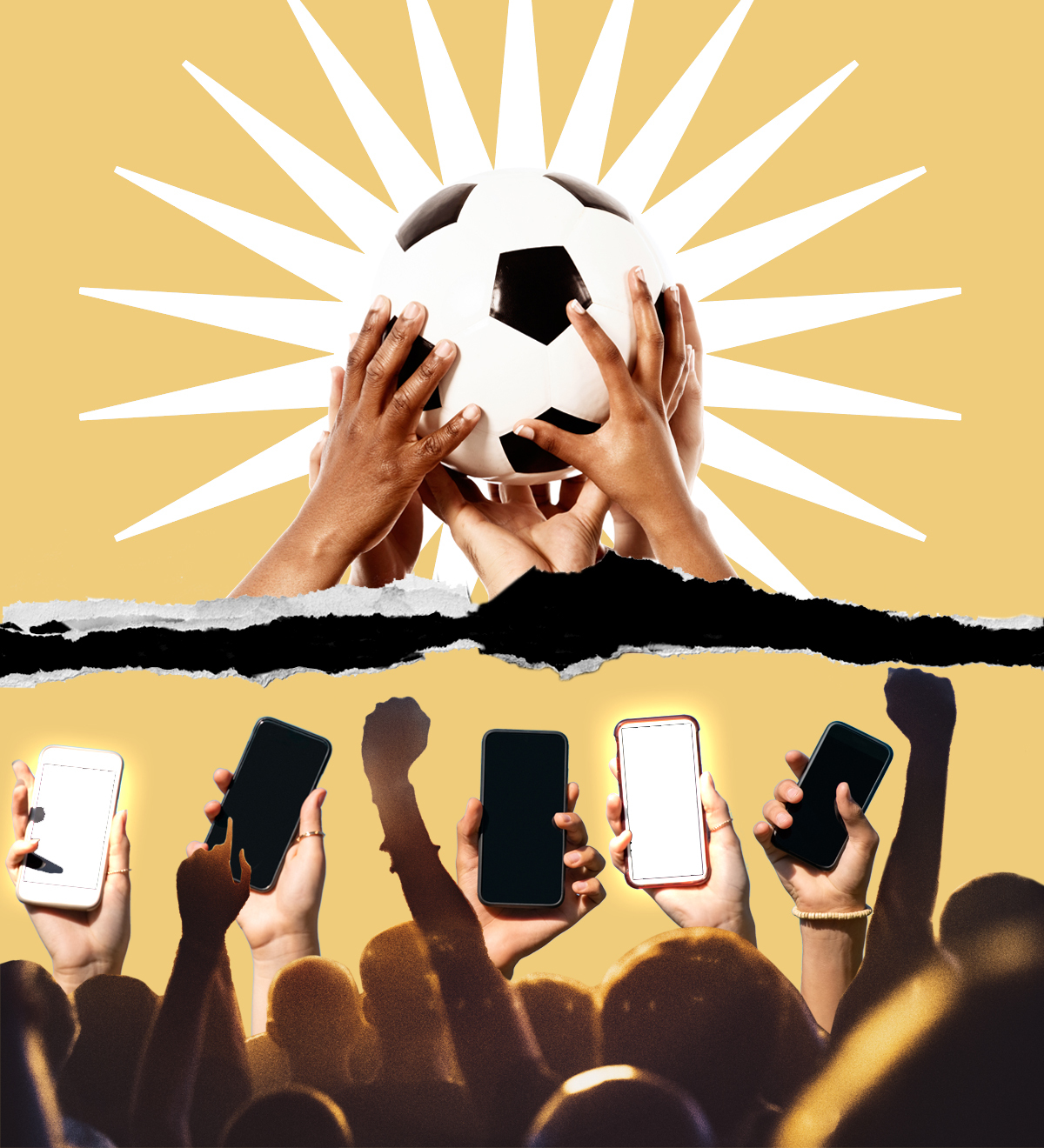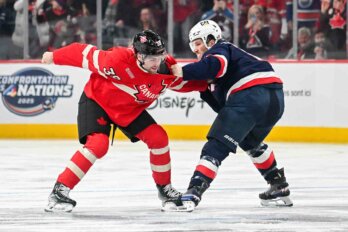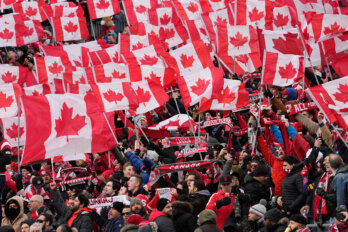The most excruciating moment of my life as a sports fan was in the summer of 2012. I was watching a women’s soccer match between Canada and the United States in the semifinals at the London Olympics. Canadian captain Christine Sinclair had scored a hat trick, and after her third goal, despite the lack of coverage that women’s sports receive on television, it felt as if the entire country was brimming with support and pride. It was a riveting gladiator-style rivalry full of physical clashes and thrilling set pieces—until the match took a terrible turn.
Listen to an audio version of this story
For more audio from The Walrus, subscribe to AMI-audio podcasts on iTunes.
Norwegian official Christina Pederson called a foul on Canadian goalkeeper Erin McLeod for holding the ball longer than six seconds—tantamount to wasting time. I was stunned. I had been playing and watching soccer for almost thirty years and had never seen that call before. I felt my face flush with anger and my shoulders tense. My children, sitting around me in our living room, were witnessing a sporting injustice a world away. At that point, Canada was winning 3–2. From the awarded free kick for the US team, Pederson then called a handball penalty against Canada. US star forward Abby Wambach tied the game.
When the US won, almost inevitably, after scoring in extra time, I felt my chest tighten so much that it hurt. When your heart breaks from frustration and anger, it is a different pain. There was no question that I was proud of the team, but the game was marred by such a bizarre call from an official whom I will hold a grudge against forever. Fans and columnists alike expressed shock at the call, and even Pia Sundhage, the coach of the US team, later said she had never seen that call actually made in a match—let alone in such an important one. Canada went on to win a bronze medal, but the events of that match convinced me to never visit Norway, irrespective of how beautiful the fjords are.
I can definitely be diagnosed with debilitating fandom. Symptoms include caring too much, feeling eternally hopeful despite bleak results, and feeling like my positivity can somehow sway the performance of the team. But my job as a sports journalist—and as one who works through an anti-oppression lens and writes and reports on the intersections of racism, misogyny, and sports—means that I’m never uncritical of sports and their systems. I may support teams unabashedly, but I also support individual players due to their public politics. Being a dedicated fan means not only caring deeply about a bad call but being affected by issues throughout the wider sports ecosystem.
As I sat on my couch watching the referee blow her final whistle to end that Canada–US game, I felt powerless. Despite the team’s enormous effort, it felt as if they had been cheated. Sports fans may be stuck at arms-length from bad calls or unfair results, seemingly disconnected as they sit in stadiums or living rooms, but what it means to be a fan is changing: cheering is no longer just an emotional act. In recent years, there have been moments when sports fans—through engagement and mobilization—have had their say on issues far graver, with consequences that reverberate off the pitch, the ice, or the court. The games and their ecosystems are changing: fans, and the power they wield, are rising.
When the COVID-19 pandemic hit, in early March 2020, the world of sports was shaken and unprepared. Hopefully we are finally emerging from what has arguably been one of the most challenging and devastating years in recent history, but we continue to reel from the effects that have disproportionately affected racialized and poor communities. The pandemic has also severely affected athletes and created more challenges for women’s sports, including wage cuts and job losses. The pandemic reset was unimaginable, but it has offered a pause to consider broader issues within and around the games.
If we think about sports as a trident, each prong—media, athletes, and fans—possesses power. Sports media is an archivist, a messenger, and a chronicler of events. But the industry is composed of an overwhelming majority of white men, according to Women’s Media Centre, and disrupting that status quo is not easy. Jemele Hill was one of ESPN’s most recognizable talents—whip smart and vibrant—as a cohost of the flagship program SportsCenter. Hill never shied away from criticizing then president Donald Trump and in 2017 tweeted that Trump was a “white supremacist.” The White House suggested that she be fired. She wasn’t, but she eventually apologized. (Hill left ESPN in 2018 and moved to The Atlantic as a contributing writer.)
Sports are political and always have been. For those of us who do not espouse oppressive and bigoted views, sports media can be a powerful vehicle to carry conversations about racial justice, labour solidarity, gender expansiveness, and even geopolitical conflicts often considered polarizing. Some have argued that, in the past few years, sports media—like many segments of society—has faced “a reckoning.” I don’t believe this to be the case. Instead, we are in the early stages of meaningful, sustainable, and profound change. But turning the sports media dial is a marathon, not a sprint.
The most critical component of sports is the athletes. Without them, sports are vacant spaces: fields without play, rinks without movement, pools without motion. Without athletes to idolize, to grieve over, to hope with, or to properly revere for how they better the world, sports are empty. Even from within rigid and powerful systems, athletes can inspire and mobilize their supporters. Last August, the WNBA’s Atlanta Dream encouraged fans to vote for Democrat Raphael Warnock in the 2020 US Senate race in Georgia. Warnock was running against Republican incumbent Kelly Loeffler—the Dream’s co-owner. In a runoff election in early 2021, Warnock was elected Georgia’s first Black senator.
Across all sports, pressure from activist fans has helped bring about change within and around the games. Those concerned with issues including pay equity and social justice have likely incited conversations in boardrooms typically filled with white men. While changes have appeared, it is naive to believe that sports teams woke up and suddenly started valuing marginalized communities. The Edmonton CFL team, for example, decided to start the process of formally dropping its offensive name last year, after finally consulting with Inuit communities and listening to fans. The team has since selected the Elks as its new name. The Washington NFL team, after close to a century using a racist name, changed it—but only after stadium sponsor FedEx demanded the change. It isn’t hard to deduce that company clients had demanded it too.
Sports are an emotional and financial commitment for fans, who go to great lengths to attend games, buy merchandise, subscribe to speciality channels, and engage on social media. A 2017 poll found that Americans spent over $56 billion on tickets, travel, food, and beverages over a preceding twelve-month period. Fans can create huge shifts not only because of their enormous capacity to invest but also because they have the attention of teams and organizations that are not quick to move on key issues.
After the USA women’s soccer team won the 2019 World Cup final, the crowd in the sold-out stadium chanted “EQUAL PAY.” The team’s fans have been unfailingly vocal supporters for the four-time world champions to receive the same compensation as the men’s team, which, as it happens, failed to qualify for the last men’s World Cup, in 2018. A recent article from Deloitte predicted that women’s sports will become a billion-dollar industry in the years ahead. This is not because the sports world has been reading feminist critiques and understands that the power and possibility of women is limitless. It is partly because fans will pour in their money. There is purity and beauty in the games, but high-level leagues are businesses. They thrive on making money, and now that they realize that women’s sports are loved and valued and craved by the masses, they will start to invest.
This spring, European soccer was rocked when teams in Italy, England, and Spain announced the start of what was called the Super League—an exclusive pan-European league with guaranteed spots for some of the continent’s wealthiest clubs. This initiative lasted less than two days before it came crashing to the ground after fans objected on social media, protested outside arenas, and emailed and called clubs in anger. One by one, teams that had initially agreed to participate bowed out. The potential funder, investment company J. P. Morgan, admitted that it had erred and “misjudged” soccer fans’ ability to protest and their unwillingness to let the chasm between rich and less financially stable clubs grow even wider.
Some sports teams and organizations have been listening and responding. After the Toronto Raptors won the 2019 NBA Championship, the team released a Raptors-branded Nike sports hijab to recognize the Muslim women who were part of the “We” in “We the North”—a first from any major professional league. That recognition, that the crux of the Raptors fan community is diverse, is a first step. John Wiggins, the team’s vice-president of organizational culture and inclusion, was a catalyst of the first all-women NBA broadcast when the Raptors played the Denver Nuggets on March 24. The analysis, colour commentary, play-by-play, and sideline reporting were done by a team of five women. The broadcast, which aired on TSN, was met with positivity, accolades, and even a shout-out from prime minister Justin Trudeau. “The underlying message that may have gotten missed: our fans are looking for something different,” Wiggins says. “This is a new day.”
All-women broadcasts and teams or players who fight anti-Blackness, anti-Indigeneity, and anti-LGBTQ2+ sentiment are all positive steps pushed for by fans. Those voices have always been there, but they are now increasingly hard to ignore. Social media has undoubtedly altered the ways in which fans and supporters engage with teams, leagues, and athletes. Fans are not restricted to Tumblr or Reddit threads but can have popular and influential social media accounts with limitless capacity for commentary, criticism, and opinion that, in earlier days, might have been heard only in a pub or around a water cooler—or in white-dominated media outlets. While the echo chambers have evolved and widened, social media has changed the way fans engage with sports. And the power they wield is not always positive.
Fans can be a source of violent toxicity. In Israel, a prominent fan group of the soccer club Beitar Jerusalem prides itself on being viciously anti-Arab—which the club itself doesn’t disavow or condemn. There are pockets all over the world where hooliganism emerges. And there are sports media spaces, such as the popular multiplatform Barstool Sports, where sexist and racist attitudes fester. Women sports journalists have reported Barstool’s legions of fans, known as “stoolies,” targeting them online in frenzied and abusive attacks. Denying any culpability is the common modus operandi of fans like this. (I have colleagues and friends who have been targeted by Barstool Sports, and I have spoken publicly about Barstool’s recklessness and lack of accountability.)
As a racialized woman in a very white and very male space, my work is impacted by online abuse. I constantly receive emails (the most if I have recently published something about racial justice or systems of misogyny) that are xenophobic, horribly misogynistic, and marinated in gendered Islamophobia. And all of this from so-called sports fans.
I have also found community. I sit on the advocacy committee of Black Girl Hockey Club, founded in 2018 by devoted Pittsburgh Penguins fan Renee Hess, who wanted to find other Black women who love hockey. For those of us who love the game even though it is still grappling with racism deeply embedded in its culture, BGHC has become a platform—for Black women but also friends, family, and allies—to talk about hockey as well as about how to combat white supremacy, police brutality, and anti-Blackness in sports. BGHC has supported grassroots girls’ hockey clubs, amplifying women’s hockey at every level and offering hockey scholarships for young Black girls. It has asked teams, players, coaches, and fans to sign a pledge to “disrupt racism on and off the ice and make hockey welcoming for everyone.”
Sports can help us heal, make us laugh, bring us tears and waves of emotions. They can wordlessly connect us to others around the world: a ball bulging the back of the net, a puck blazing through the goaltender’s legs, a catch in the end zone with no time left on the clock. These are moments that bind us. We all remember where we were when Raptors forward Kawhi Leonard sank that shot. I was hosting my son’s nineteenth birthday party and had twenty young men in my home. Time stood still as we watched that ball curve, then bounce on the rim four times, then finally sink—as if in slow motion. We started jumping up and down so much that it felt like the house was shaking. I have exchanged videos of that moment with so many friends and family since. Our responses were similar. Irrespective of so many things—age, team loyalty, race, religion, cultural affiliation, gender identity—something that will always tie us together is the jubilation of that shot landing and how we rejoiced because the basketball goddesses gave us the chance to cheer.
But, in order to be pragmatic supporters of a club or team, we need to interrogate what it means to be a fan. Does each of us recognize that there is a path of integrity that accompanies our love of the games? Are we brave enough to be unconditionally inclusive of all members of society? Can sports truly become the connector we know it can be?
“To be a fan is also to be taken for granted,” writer and soccer podcaster Musa Okwonga, who is also a friend, told me, “because who can ever really appreciate that much love? Not the players, not the directors, not the managers: much as they might try, not really. The only ones who can truly appreciate what you give are the other fans just like you. And so, no matter what happens on the field or in the boardroom, we can look to each other for the love that we deserve.” That love is part of who I am and is something I have also passed on to my kids, although they tend to follow specific athletes instead of pledging lifelong allegiance to a team. They are more critical than I was in my teens and early twenties, with a passion for sports and a desire to feel connected to all of it. The next generation will make excellent and educated fans. I hope my own kids do too. This is something I shall nurture—with care and caution.
With our new influence comes new responsibility, and being a fan is not something we should take lightly. We should be emboldened to emulate heroes like Muhammad Ali, LeBron James, Maya Moore, Colin Kaepernick, Megan Rapinoe, and Serena Williams—a group that stood up or took a knee when their integrity and principles called for it and when their identities as heroes of marginalized communities demanded it. We, as fans, should hold our loyalties and associations with pride and act as if our commitment to sport inherently matters—because it always will.
In 1972, my mother moved to Canada and promptly fell in love with the Montreal Canadiens. She met Guy Lafleur a few years ago and asked him to sign the jersey of his she wore along with a matching red hijab. He happily did. I grew up as an ardent Habs fan even though I have spent most of my life in Toronto Maple Leafs territory. I had a picture of Canadiens goaltender Patrick Roy in my locker through middle school and wanted to be like the legendary Ken Dryden, a lawyer and a professional athlete. It is difficult not to get swept up in the excitement as the Montreal Canadiens move forward in this year’s NHL playoffs. My mother’s excitement is infectious, and her adoration of goaltender Carey Price is charming. She prays for him regularly. My relationship with hockey culture, however, has been fraught. Today, I support women’s hockey through the Professional Women’s Hockey Players Association and the NWHL, and I own a Team Bauer jersey with the Canadian women’s national hockey team captain’s name on the back: POULIN. But, as far as men’s hockey goes, I have recently decided to change my NHL loyalty from the Canadiens to the Seattle Kraken—the league’s newest team, which will play its first game next season. The team has already signed Black Girl Hockey Club’s #GetUncomfortable pledge, beginning to fight a toxic culture of racism in hockey and beyond. It’s a team I will proudly support. That being said, I am not looking forward to telling my mother.




